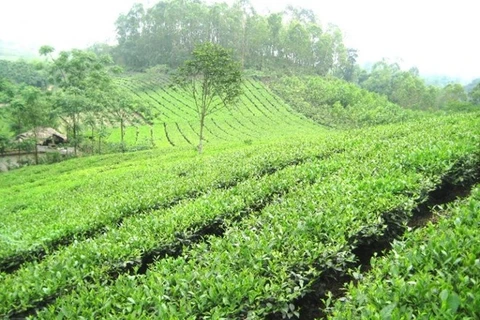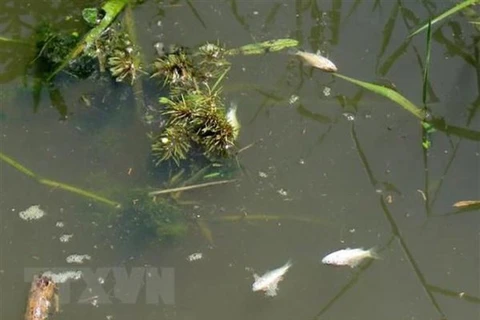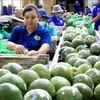Phu Tho (VNA) – The northern mountainous province of Phu Tho is pursuing the policy of developing agriculture, with one of the priorities being building trademarks for local farm specialities, some of which have long been known wide and far inside Vietnam.
A typical speciality of Phu Tho is Doan Hung pomelo, which earns its fame across the country for unique aroma, juicy and freshly sweet vesicles and thin rind. The pomelo has been closely associated with the province’s image as Vietnam’s ancestral land, where the legendary Hung Kings founded the first country in Vietnam’s history.
Two varieties of Doan Hung pomelo – the Suu Chi Dam and Bang Luan, have been recognised as national asset and granted geographical indication (GI).
Doan Hung district lies at the gateway to Phu Tho province, 150km north-west of Hanoi capital, bridging the North midland region and the mountainous area.
As of the end of 2018, Doan Hung pomelo was grown on about 1,200 ha of land in Phu Tho.
Besides the Doan Hung pomelo, other citrus varieties have been cultivated in the province, such as the Dien pomelo which originated in Hanoi. Phu Tho now has nearly 4,000 ha of land under citrus trees, which produce more than 21,000 tonnes of fruit each year.
Another local speciality of Phu Tho is roosters with nine spurs, which is mentioned in the myth “Son Tinh - Thuy Tinh” about the God of the Mountain and the God of the Water. The nine-spur rooster was one of the three wedding presents demanded by the Hung King of the would-be groom of Princess My Nuong.
The chicken species is indigenous to Tan Son district located deep inside the Xuan Son national park. It is now raised at farms in Xuan Son, Xuan Dai, Kim Thuong, Dong Son and Tan Son communes.
According to Vu Tien Bac, vice chairman of Tan Son district’s People’s Committee, the nine-spur chickens are raised semi-wild. Farmers only feed them in the morning, then release them to the forest. The chickens return to their pens by themselves in the evening. Under this method, the chickens grow very slowly, reaching 1.2-1.6kg (for hens) and 2-2.2kg (roosters) after one year, and their meat has unique taste different from those raised in the normal way.
The chicken is much sought after as a gift on the occasion of the New Year because many believe it can bring luck.
More than 20 local agricultural products in Phu Tho have earned collective or individual trademarks and GI certificates. The province also counts 42 products having local advantages.
Phu Tho has selected 21 out of its 42 local specialities for development under the One Commune One Product (OCOP) programme.
Tran Tu Anh, deputy director of the provincial Department of Agriculture and Rural Development, said in order to promote local specialities with high commercial value, Phu Tho has made detailed plans for production and processing zones of those products, involved research establishments in transferring scientific and technological advances to farmers and enterprises in all links of the production chain, from variety selection and cross breeding, intensive farming, post-harvest preservation, process to assistance in production and building trademarks of products.
The province aims to create breakthroughs in the productivity and quality of farm products, thus developing production, enhancing economic value and income for farmers. It plans to adopt mechanisms to encourage organisations and individuals to propose initiatives as well as scientific and technical solutions to increase product quality and value. Phu Tho will also intensify efforts in promoting local products in new markets.
A priority in the province’s plan of actions is to popularise the role of intellectual property (IP) in the production and trade of goods. It will help local producers to establish IP rights for traditional products such as citrus and tea.-VNA

























